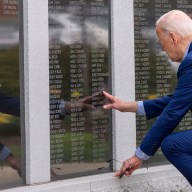By Elizabeth Barber
BOSTON (Reuters) – Four decades after a U.S. judge ordered Boston to desegregate its schools, sparking a wave of violent protest, the incident is set to formally become a part of the history curriculum in the city’s public schools. While Boston Public Schools have long included desegregation and race relations in history and social studies courses, the lessons have largely focused on events in the southeastern United States.
“We’re not going to let Boston off the hook any longer,” Kerry Dunne, director of history and social studies at the Boston Public Schools, said on Monday. The decision, announced internally earlier this month, calls for the local lessons to begin in September. In 1974, a federal court in Boston ruled that public schools in the Massachusetts capital were in violation of the 1965 Racial Imbalance Act and needed to even out classroom demographics by busing students to schools outside their neighborhoods. The order met with sometimes violent responses, with some residents of white-dominated areas throwing bricks at buses loaded with black students and some white parents refusing to send their children to schools in majority black areas. The new curriculum will confront not just the 1974 ruling, but it will teach that segregation in Boston was a slow boil, beginning with discriminatory housing practices decades earlier that divided the city by race, said Dunne. It will also show that inequality between races is still an insidious problem in Boston, she said. “Our schools are not fully desegregated,” said Dunne. “This is a long journey.”
Boston was one of dozens of U.S. cities to see waves of protests following decisions by grand juries last year not to indict white police officers after they killed unarmed black men in Ferguson, Missouri and New York City while trying to arrest them. “Young people in Boston are really needing to understand not just Ferguson, but also how racism works in Boston,” said Donna Bivens, project director of theBoston Busing/Desegregation Project, a local education group focused on the issue. “What’s happening elsewhere in the country is happening here, even if it’s subtler.” The new curriculum will roll out next school year, but teachers are encouraged to offer one lesson on Boston busing now in commemoration of the 40th anniversary of the court order, said Dunne.
Boston did away with what was left of its 1974 busing system in 2013, in an effort to cut students’ commutes.
(Editing by Scott Malone and Susan Heavey)
















